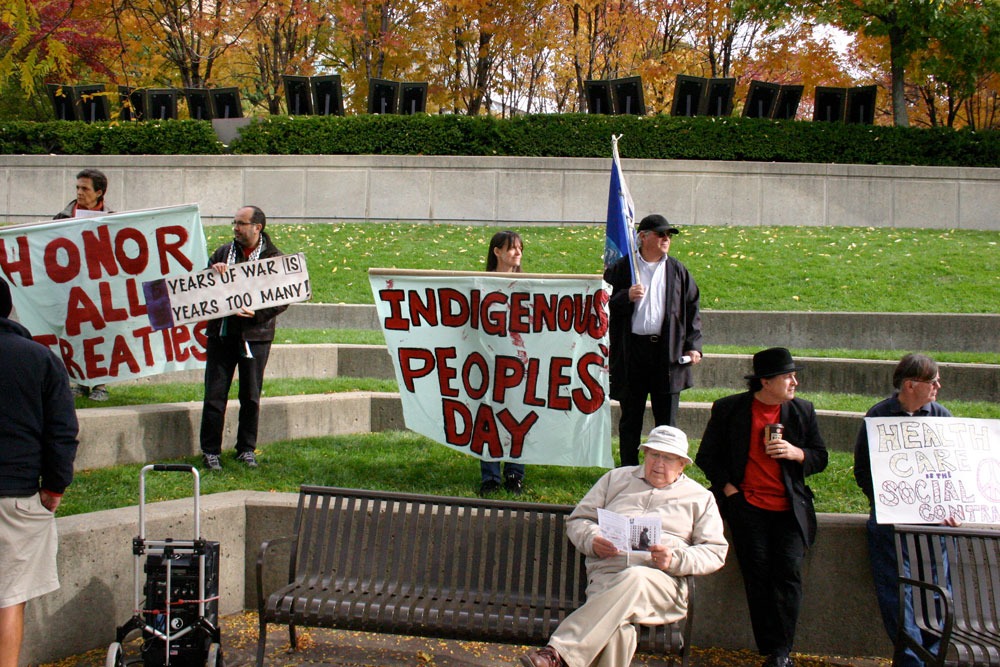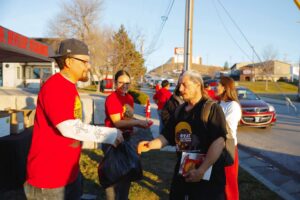
October 7, 2020; Smithsonian Magazine and Baltimore Sun
This week, the Baltimore City Council voted to rename Columbus Day as Indigenous Peoples’ Day. The measure passed unanimously and awaits the signature of Democratic Mayor Bernard C. “Jack” Young. The Council is hoping the mayor will sign the bill in time for the law to take effect before October 12, so that Indigenous People’s Day can be officially celebrated in Baltimore this year. Democratic Councilman John T. Bullock was the sponsor of the legislation.
City Council President Brandon Scott, now the Democratic nominee for mayor, had tried to get the holiday changed in 2016, but he was glad to see the Council take action now. Scott tells Talia Richmond of the Baltimore Sun that, “We have to celebrate history as it happened, and not as people imagine it happened.” Scott adds that the discussion is part of the country’s grappling over “the legacy of systemic racism and oppression.”
In Baltimore, the change in holiday was not an isolated act. This summer, on July 4th, protesters toppled a marble statue of Christopher Columbus in Little Italy and dumped it in the Inner Harbor, calling for the removal of all monuments “honoring white supremacists, owners of enslaved people, perpetrators of genocide and colonizers.” The council voted at the same meeting to give final approval to legislation to rename the Columbus Obelisk monument in a city park as the “Victims of Police Violence Monument.”
Jessica Dickerson, of the Lumbee Tribe of North Carolina, tells Talia Richman of the Baltimore Sun that she is relieved and grateful that Baltimore “is now on the right side of history,” adding that, “We no longer have to be subject to Baltimore City celebrating someone who we describe as a murderer, someone who has taken so much from us.”
Sign up for our free newsletters
Subscribe to NPQ's newsletters to have our top stories delivered directly to your inbox.
By signing up, you agree to our privacy policy and terms of use, and to receive messages from NPQ and our partners.
As Richman points out, Baltimore’s action is hardly alone. Nearby Howard County voted to change from Columbus Day to Indigenous People’s Day last month, with leaders there saying it was a step toward recognizing the harm done to Native Americans. Other nearby communities taking action include Rockville (county seat for Montgomery County, which borders Washington, DC) and the school board of Loudon County in northern Virginia. Further afield, also officially celebrating Indigenous Peoples Day this year is Arizona, where Governor Doug Ducey (R) signed a proclamation recognizing the “historic injustices suffered by Indigenous people.”
According to Renée Gokey in Smithsonian Magazine, in addition to Arizona, 14 other states—Alabama, Alaska, Hawaii, Idaho, Maine, Michigan, Minnesota, New Mexico, North Carolina, Oklahoma, Oregon, South Dakota, Vermont, Wisconsin—and the District of Columbia; more than 130 cities; and growing numbers of school districts now celebrate Indigenous Peoples’ Day in place of or in addition to Columbus Day.
Adoption of the Indigenous People’s Day holiday nationally has been rapid. Back in April 2019, NPQ’s Erin Rubin, writing about a vote in New Mexico to honor the holiday, noted 60 cities honored the holiday. A year ago, Raymond Foxworth wrote in NPQ that eight states, including New Mexico, celebrated the day. Now, a year later, there are 15 states and over 130 cities.
So, with Indigenous People’s Day this Monday, how can people honor the holiday? Gokey, who is also teaching services coordinator at the National Museum of the American Indian (NMAI), suggests five ways:
- Plant Native: Gokey notes that native plants support a “healthy ecosystem” and highlights the pawpaw tree, which is common east of the Mississippi. October, she says, is when the pawpaw fruit ripens, and her Native nation, “the Shawnee, call this time of year…the pawpaw moon.”
- Read an Indigenous writer: One book Gokey recommends for high schoolers and their parents is An Indigenous Peoples’ History of the United States for Young People, adapted by Dr. Reese and Jean Mendoza from Roxanne Dunbar-Ortiz’s more academic An Indigenous People’s History of the United States.
- Attend an online Indigenous Peoples’ Day celebration: The NMAI will live-stream a one-hour virtual celebration on Monday the 12th starting at 1 pm Eastern Time. The event is geared for students in middle school or high school, but open to all.
- Help teach a more truthful history of Columbus and the Indigenous peoples of the Caribbean Islands: A short guide about the Taino, the native inhabitants of the Caribbean islands where Columbus and his crew landed, is available here.
- Get informed and be an advocate: Gokey points to the NMAI’s Native Knowledge 360 website as a useful hub.
As Foxworth noted a year ago, Indigenous Peoples’ Day celebrates “indigenous survival in the face of a genocidal invasion that began in 1492 when an Italian sailor, Christopher Columbus, stumbled upon the Caribbean islands.” It is a time, as he reminds us, to combat the erasure of Native people, to honor Native resistance and resilience, and to celebrate the hundreds of vibrant Native American cultures that remain with us today.—Steve Dubb












